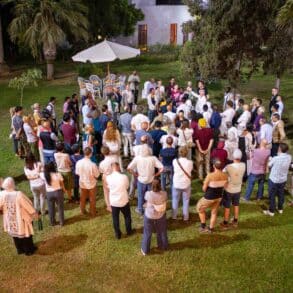The topic of governance in organizations is very alive these days, especially when those organizations are founded with spiritual practices at the core. The tension between individual freedom and coherence as an organization, between spiritual guidance and meeting the needs of the material world effectively and sustainably, has to be reconsidered. This article is an attempt to see good governance as a bridge between the gifts of inner worlds and the social benefit of organizational coherence.

Governance is a social process. Its history is as long as that of societies, which organized themselves around a set of operating agreements, oral or written. This history is part of us, our collective inheritance, and we carry it at the cellular level. Consciously or unconsciously, it resides in how we form our lives as individuals and as social beings; it manifests in the multitude of agreements that make daily life workable. Grammar governs language; the colors of traffic signals govern traffic safety. Government, or the political state, grew out of governance processes as human consciousness evolved from organizing around ministerial or theological order to the more participatory and secular forms of the modern day. This evolutionary development and the ongoing dynamic between the rule of “church and state” is a reflection of the evolution of our consciousness as social beings whose needs are both material and spiritual.
We recognize the need for governance in the material world but bristle at the governance of spiritual matters. This is a natural and rightful tension, as each of us also carries within us the ever-present intersection of the spirit and social impulses, the meeting of our “I” with the reality of the world. Understanding how we each navigate the flow between the two as individuals is likely a reflector of how we navigate the collective I-and-world as organizations.
Governance in Western Culture
We are bound to work together out of the gifts of our individualities. That is the modern condition and a rising dilemma since the quality of governance, which we in the modern Western streams have inherited, comes primarily from ancient Rome. The Romans were masters of the material world. They developed law in the form we know it—the powerful few creating agreements for the many—and practiced governance imperially, in control, and centrally directed. In essence, for governance in the Roman Empire, power meant power over.
Lost in the narrative of Western political history are forms of governance that could be characterized as coming from the lineage of community self-determination and which were based upon circles, collaboration, trust, equality, and, ideally, altruism—in essence, power with. In this context, agreements are more consensual. Yet, this latter picture is not what comes to mind when one mentions the word “governance” in most organizational settings. Instead, the word conjures an image of a force outside ourselves that, at best, protects our rights and, at worst, attempts to control our thoughts. Individual freedom and governance are cast in terms of polarity and conflicting forces, or in terms of oppressor and oppressed. Now is the age of questioning and questionable authority. The narrative and soul conditions that support a drift toward authoritarianism are in desperate need of transformation.
In speaking about the supposed polarity between individual freedom and a body of laws or agreements, Albert Schweitzer wrote the following in Christianity and the Religions of the World: “As modern men we imagine the state of the perfect human society to be one of harmony between legal organization and the practice of love. Jesus does not attempt to harmonize justice and love but says to man: If you want to be in the spirit of God, you may not think or act otherwise than in love.”1 While this is coming from a particular religious viewpoint, it holds much wisdom for the future of governance practices by establishing love, and the trust that attends it, as the ultimate value. In some ways, it might be possible to imagine that if we lived in pure love and trust, we would need no governance structures at all. Instead, we would recognize and be guided by the highest altruistic or spiritual principles in community and global life—principles living so deeply in our hearts that we would need no written code except the meeting of human beings—a picture for a worthy future.
The Redemption of Governance for Our Time
It is time for the redemption of governance. It is time to restore it to its rightful function in service to the positive ends of credibility, trust, transparency, and freeing up of human capacity. Governance could rightfully flow from a moral, ethical, and spiritual place, out of a love for and service to humanity. Material matters are necessary to meet real economic needs, but power, control over markets, and the extraction of capital have distorted the social economy and celebrated its injustice as a peculiar victory for a limited few. Good governance is an absolute necessity for the wellbeing of an organization and the human beings that it touches. Any system that does not recognize the human desire for and conditions of participation is bound to generate a dehumanizing impulse for the sake of profit. So, the redemption of governance requires a transformation and redemption of self so that new agreements can arise out of what is deeply human and spiritual.
Integrating Individual and Organizational Threefolding
Governance is not a thing outside of us. It is a faculty we hopefully exercise inwardly for ourselves constantly as we live our lives. Understanding how we come to govern ourselves, that is, how we develop this inner capacity from birth to adulthood, has much to offer in renewing our imagination and practice of positive governance in organizations. The core goal is transforming assumptions about power into a framework of empowerment.
A brief foray into human development from the perspective of governance might illuminate a path of transformation. The first seven years of life are based in learning through will, and physical needs are met through gift. The dependent child is learning about accountability through how their needs are met. They are learning an aspect of economic life. The years from seven to fourteen are very much based in the feeling life, learning about sympathies and antipathies through relationship. The life of rights and agreements, authority and self-discipline are central. Years fourteen to twenty-one focus on the development of thinking, developing a sense of self and purpose in life. One’s destiny or spiritual center begins to appear, as does the awareness of the world and the capacity of responsibility for others.
Accountability, authority, and responsibility are the three integral legs of good governance and should never be separated, just as it is critical for our wellbeing to integrate our developmental experience. If one of the legs is to be delegated, the other two are necessarily articulated and delegated as part of the process. To do otherwise makes governance ineffective and introduces a dehumanizing ethos into an organization. For example, imagine being given all the responsibility for raising a child but with no authority to decide anything for that child. Ineffective governance compromises organizational credibility.
There is a threefold picture here. Accountability attends to the sphere of economics, the sphere of meeting needs. Authority emerges in the sphere of rights and agreements. Responsibility arises from the sphere of individual gifts and capacities, the cultural or spiritual sphere. In the name of good governance, the founders of a corporate entity receive all the authority, responsibility, and accountability from the state at incorporation. They need to have a clear path and process for delegating the unity of the three to management, and ideally, the unity will flow through the whole organization. Once governance is in place, and all agree to trust and abide by the delegations and policies, then the threefold principles of freedom in the cultural or spiritual life, equality in rights and agreements, and interdependence in economics take on a new and dynamic quality. A well-governed organization is far more likely to maintain its cultural freedom the more deeply it understands and manages its realms of economics, rights, and agreements.
The Work Ahead
We live within a framework of agreements, micro and macro, some unconscious, some conscious, some constitutional, some convenient, and some in constant creation. There is one consistent aspect of meaningful and constructive agreements, however: no agreement can be created unilaterally for another party. Framed in another way, one could say that the constructive purpose of governance is to lay the foundation for leadership, and for authority, responsibility, and accountability within an organization, and to advance the purpose for which that organization was created in the first place.
Every incorporated organization, even in following the law of the land, has to make its own governance choices in accord with its identity, mission, maturity, and strategy. Every organization has a destiny—it was brought into the world for a purpose and operates within a framework of agreements. And yet, the “ego” can take two paths. One path is the directive path that flows from a singular source and controls the actions and participants in the organization. The other is the collaborative path in which the “ego” resides in the agreements between the participants and frames the limitations of the actions. Part of those agreements is freeing up leadership based on capacities. This latter path is, to my mind, the way of the future, but it is entirely dependent upon a very highly evolved capacity to develop, abide by, and hold each other accountable to agreements—in love and trust.
Photo Karl Abuid









